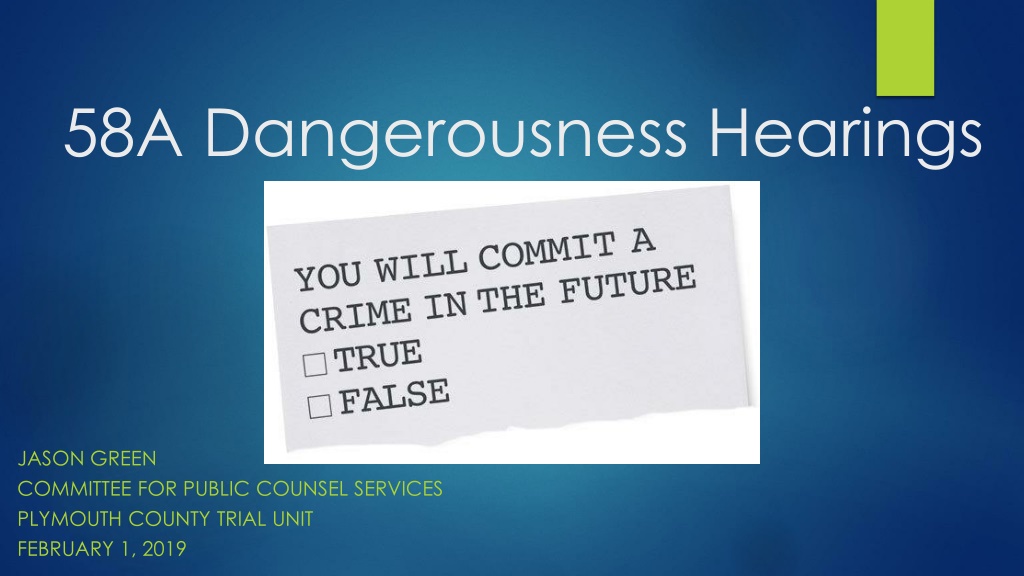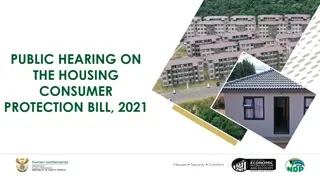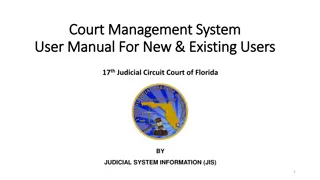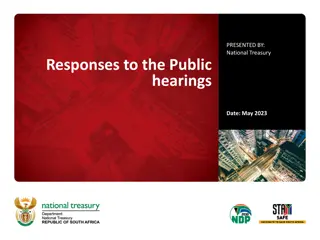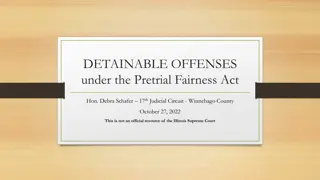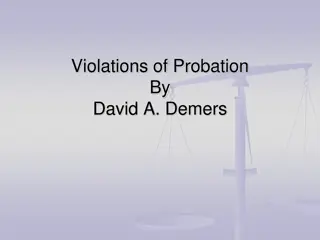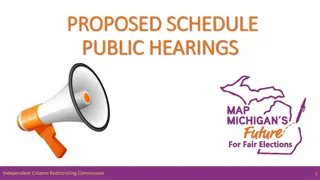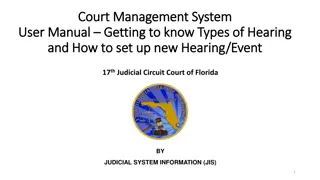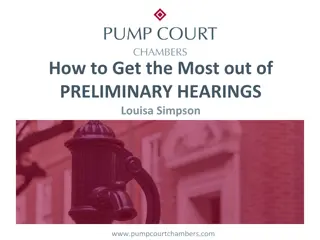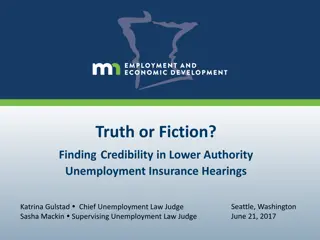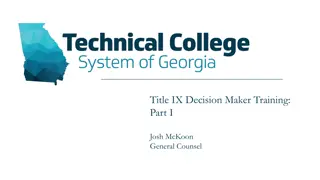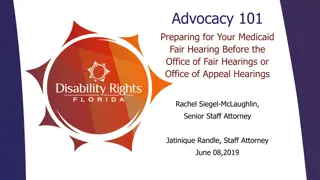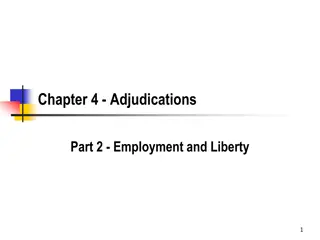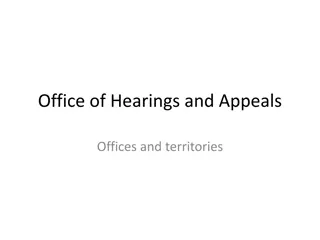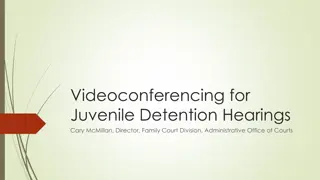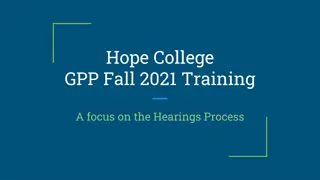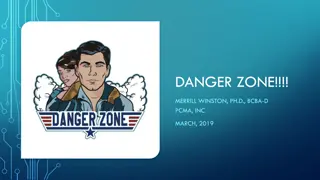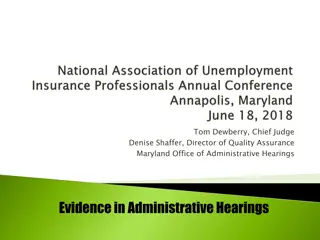Understanding Dangerousness Hearings Under G.L. c.276, 58A
This content delves into the legal framework surrounding dangerousness hearings in Massachusetts, particularly under G.L. c.276, 58A. It covers the types of charges that warrant such hearings, when and where they can be initiated, historical development of the statute, and the constitutional principles governing the process. Through notable case references, it explores the requirements for proving probable cause, the elements of the Force Clause, and the significance of substantive and procedural due process in these hearings.
Download Presentation

Please find below an Image/Link to download the presentation.
The content on the website is provided AS IS for your information and personal use only. It may not be sold, licensed, or shared on other websites without obtaining consent from the author. Download presentation by click this link. If you encounter any issues during the download, it is possible that the publisher has removed the file from their server.
E N D
Presentation Transcript
58A Dangerousness Hearings JASON GREEN COMMITTEE FOR PUBLIC COUNSEL SERVICES PLYMOUTH COUNTY TRIAL UNIT FEBRUARY 1, 2019
G.L. c.276, 58A Where can the Commonwealth move for a dangerousness hearing? District Court G.L. c.276, 58A(2) (Appearance before district court or superior court ) Superior Court Commonwealth v. Murchinson, 428 Mass. 303 (1998) (Defendant held on dangerousness prior to indictment is entitled to new hearing at superior court arraignment, but extent of hearing is in discretion of judge) Juvenile Court Victor V. v. Commonwealth, 423 Mass. 793, 794-796 (1996) (Same powers as District Court) What type of charges permit the Commonwealth to move for a dangerousness hearing? Force Clause Abuse Clause Specific Enumerated Offense When can the Commonwealth move for a dangerousness hearing? Upon the person s first appearance before the court When does the hearing take place? Immediately Commonwealth may request a three (3) business day continuance Defendant may request a seven (7) day continuance Additional continuance requires showing of good cause
G.L. c.276, 58A Historical Development of the Statute Aime v. Commonwealth, 414 Mass. 667 (1993) Found that the previous version of the pretrial detention statute which did not provide for a hearing or mandate that the Commonwealth meet a particular burden or permit the defendant to present witnesses, evidence, or to cross-examine witnesses, violated the due process clause of the Fourteenth Amendment to the United States Constitution Requirement to comply with substantive due process and procedural due process Substantive due process = where a fundamental right is involved statutes are upheld where they are narrowly tailored to further a legitimate and compelling government interest Procedural due process = once a statute or governmental action has survived substantive due process, it still must implemented in a fair manner Mendonza v. Commonwealth, 423 Mass. 771 (1996) Foundational case analyzing and upholding the constitutionality of G.L. c.276, 58A under the Massachusetts Declaration of Rights The requirement of proving probable cause for the predicate offense is inherent in the scheme of the statute Mendonza v. Commonwealth, 423 Mass. 771, 787-788 (1996)
G.L. c.276, 58A(1) Force Clause a felony offense that has as an element of the offense the use, attempted use or threatened use of physical force against the person of another Home Invasion G.L. c.265, 18C Unarmed Robbery G.L. c.265, 19 Rape of Child G.L. c.265, 22A Rape G.L. c.265, 22 Human Trafficking G.L. c.265, 51 Determined under a Categorical Approach An analysis of the elements of the offense, rather than the facts of or circumstances surrounding the alleged conduct Scione v. Commonwealth, 2019 WL 190364, *2 (2019) Commonwealth v. Young, 453 Mass. 707, 712 (2009)
G.L. c.276, 58A(1) Abuse Clause arrested and charged with a misdemeanor or felony involving abuse as defined in section 1 of chapter 209A Abuse is defined as the occurrence of one or more of the following acts between family or household members: (a) attempting to cause or causing physical harm; (b) placing another in fear of imminent serious physical harm; or (c) causing another to engage involuntarily in sexual relations by force, threat or duress Family or household member is defined as persons who: (a) are or were married to one another; (b) are or were residing together in the same household; (c) are or were related by blood or marriage; (d) having a child in common regardless of whether they have ever married or lived together; or (e) are or have been in a substantive dating or engagement relationship, which shall be adjudged by district, probate or Boston municipal courts consideration of the following factors: (1) the length of time of the relationship; (2) the type of the relationship; (3) the frequency of interaction between the parties; and (4) if the relationship has been terminated by either person, the length of time elapsed since the termination of the relationship
G.L. c.276, 58A(1) Abuse Clause Determined under a noncategorical approach [A] judge may look beyond the elements of a crime to the surrounding circumstances of the alleged offense to determine whether it is [a] misdemeanor or felony involving abuse and thus a predicate offense under 58A Scione v. Commonwealth, 2019 WL190364, *8 (2019) Allowing for the examination of the underlying facts giving rise to the charge in question is supported by the legislative history of 58A to combat domestic violence
G.L. c.276, 58A(1) Specific Enumerated Offenses Violation of abuse prevention order G.L. c. 208, 18, 34B, 34C; G.L. c. 209, 32; G.L. c. 209A, 3, 4, 5; G.L. c.209C, 15, 20 Witness intimidation Operating under the influence, third offense Must be within 10 years of the previous conviction Second or subsequent offense of possession of a weapon or machine gun by a defendant with a previous conviction of incarceration for a violent crime, all as defined in G.L. c.140, 121 Violent crime: any crime punishable by imprisonment for a term exceeding one year, or any act of juvenile delinquency involving the use or possession of a deadly weapon punishable by imprisonment if committed by an adult, that: (i) has as an element the use, attempted use or threatened use of physical force or a deadly weapon against the person of another; (ii) is burglary, extortion, arson or kidnapping; (iii) involves the use of explosives; or (iv) otherwise involves conduct that presents a serious risk of physical injury to another Weapon: any rifle, shotgun, or firearm Machine Gun: a weapon loaded or unloaded, from which a number of shots or bullets may be rapidly or automatically discharged by one continuous activation of the trigger, including a submachine gun bump stocks and trigger cranks
G.L. c.276, 58A(1) Specific Enumerated Offenses Possession of a firearm Carrying a firearm G.L. c.269, 10(a) Possession of a machine gun or sawed off shotgun G.L. c.269, 10(c) Possession of a large capacity weapon or feeding device G.L. c.269, 10(m) Cannot move only on possession of a feeding device, must have simultaneous possession of a large capacity weapon Armed career criminal (ACC) enhancement G.L. c.269, 10G Animal cruelty offenses Malicious killing or maiming G.L. c.266, 112 Animal cruelty G.L. c.272, 77 Prohibition against owning, possession, training, promotion fighting animals G.L. c.272, 94 Drug offense with a possible mandatory minimum sentence of three (3) years or more
G.L. c.276, 58A(1) Residual Clause Held unconstitutionally vague in Scione v. Commonwealth, 2019 WL 190364 (2019) Previously permitted the Commonwealth to move for dangerousness against a defendant charged with any other felony that, by its nature, involves a substantial risk that physical force against the person of another may result Practice Tip: consider a motion to vacate a dangerousness finding that was based upon a predicate offense that only qualified under the residual clause Dangerousness finding entered in the statewide domestic violence database Dangerousness finding now included on CORI/CARI Enhanced revocation time standards against defendants on conditions of release pursuant to 58A(2)
G.L. c.276, 58A(4) When a person is held under arrest for a predicate offense and upon a motion by the Commonwealth the court shall hold a hearing to determine whether conditions of release will reasonably assure the safety of any other person or the community Held under arrest: refers to any person who has been arrested or for whom an arrest warrant has issued in connection with one of the enumerated offenses in G.L. c.276, 58A(1) Commonwealth v. Diggs, 475 Mass. 79, 85 (2016) Predicate offense: threshold question in every case is whether the defendant has committed a predicate offense under 58A(1), thereby triggering the Commonwealth s right to move for a 58A hearing Commonwealth v. Young, 453 Mass. 707, 711 (2009) Commonwealth s motion: in order to consider dangerousness in setting conditions or bail the Commonwealth must move for a hearing pursuant to the procedural safeguards of 58A Brangan v. Commonwealth, 477 Mass. 691, 704-707 (2017) Shall hold a hearing: once the Commonwealth has established probable cause to arrest for a predicate offense at the first appearance the court shall hold a hearing, or for good cause, shall allow a continuance of up to three (3) business days for the Commonwealth or seven (7) days for the defendant and shall detain the defendant during that time pending the hearing Commonwealth v. Lester L., 445 Mass. 250, 257-261 (2005)
G.L. c.276, 58A Standard Probable cause for the predicate offense live issue at the hearing Nature and circumstances of the offense is also one factor the court shall consider in determination of whether there are conditions of release that will reasonably assure the safety of any other individual or the community G.L. G.L. c.276, 58A(5) Clear and convincing evidence that no conditions of release will reasonably assure the safety of any other person or the community G.L. c.276, 58A(3) Presumption of innocence applies - G.L. c.276, 58A(6) Possible Outcome Release on personal recognizance Release on conditions of release pursuant to G.L. c.276, 58A(2) Detained without bail pursuant to G.L. c.276, 58A(3) Evidentiary Standards The rules concerning admissibility of evidence in criminal trials shall not apply to the presentation and consideration of information at the hearing and the judge shall consider hearsay contained in a police report or the statement of an alleged victim or witness - G.L. c.276, 58A(4) Garcia v. Commonwealth, 481 Mass. 1005, 1006 (2018) Abbot A. v. Commonwealth, 458 Mass. 24, 35-36 (2010) (Hearsay bearing substantial indicia of reliability) Minimum Due Process G.L. c.276, 58A(4) Right to counsel, to testify, to present witnesses, evidence and information, and to cross-examine witnesses Special rules for summonsing the alleged victim or the alleged victim s family shall demonstrate to the court a good faith basis for the person s reasonable belief that the testimony from the witness will be material and relevant to support a conclusion that there are conditions of release that will reasonably assure the safety of any other person or the community
G.L. c.276, 58A(5) Pursuant to G.L. c.276, 58A(5) the justice, shall, on the basis of any information which he can reasonably obtain in determining whether there are conditions of release that will reasonably assure the safety of any other person or the community take into account: The nature and seriousness of the danger posed to any person or the community that would result by the person s release The nature and circumstances of the offense charged The potential penalty the person faces The person s family ties Employment record and history of mental illness Reputation The risk that the person will obstruct or attempt to obstruct justice, or threaten, injure or intimidate, or attempt to threaten, injure or intimidate a prospective witness or juror Record of convictions History of illegal drug distribution or present drug dependency Whether the person is on bail pending adjudication of a prior charge Whether the acts involve abuse as defined in G.L. c.209A, 1 Whether the acts involve violation of an abuse prevention order or the person has a history of abuse prevention orders Whether the person is on probation, parole, or other release pending completion of a sentence for any conviction Whether the person is on release sentence imposition or appeal for any conviction For violations of abuse prevention orders, assault and battery on a family or household member, strangulation or suffocation, or offenses involving abuse as defined in G.L. c.209A, 1 the justice must make a written determination of these factors to be included in the statewide domestic violence database
G.L. c.276, 58A(2) Not commit a federal, state, or local crime during period of release, and the least restrictive further condition, or combination of conditions, that such judicial officer determines will reasonably assure the appearance of the person as required and the safety of any other person and the community Remain in the custody of a designated person who agrees to assume supervision and report any violation of a release condition to the court Practice Tip: if you intend to offer this condition, consider calling this person as a witness for the defendant Maintain or actively seek employment Maintain or commence an educational program Abide by specified restrictions on personal association, place of abode, or travel Avoid all contact with an alleged victim and any witness or potential witness Report on a regular basis to a designated agency Comply with a specified curfew Refrain from possessing a firearm, destructive device, or other dangerous weapon Refrain from excessive use of alcohol, or any use of a narcotic drug or other controlled substance without a prescription Undergo available medical, psychological, or psychiatric treatment, including from substance use disorder, and remaining in a specified facility, if required Execute an agreement to forfeit a value of unencumbered property, including money, on failure to appear Execute a bail bond with solvent surety who will execute an agreement to forfeit unencumbered property on failure to appear Return to custody for specified hours following release for employment, school, or other limited purpose Participate in a community corrections program (OCC) requires consent of the defendant Any other condition reasonably necessary to assure the appearance of the person as required and to assure the safety of any other person and the community The judicial officer may not impose a financial condition that results in the pretrial detention of the person
G.L. c.276, 58A(3) If, after a hearing the district or superior court justice finds by clear and convincing evidence that no conditions of release will reasonably assure the safety of any other person or the community, said justice shall order the detention of the person prior to trial Person detained must be brought to trial as soon as reasonably possible District Court shall not exceed 120 days Superior Court shall not exceed 180 days Excludes any period of delay defined in Mass. R. Crim. P. 36(b)(2) Commonwealth v. Graham, 480 Mass. 516, 524 n. 13 (2018) (Encouraging contemporaneous recording of excludable time periods under Rule 36(b)(2) where defendant held pursuant to 58A) A justice may not impose a financial condition under this section that results in the pretrial detention of the person - G.L. c.276, 58A(3) Nothing in this section shall be interpreted as limiting the imposition of a financial condition upon the person to reasonably assure his appearance before the courts - G.L. c.276, 58A(3) Except in cases where the person is determined to pose a danger to the safety of any other person or the community under section 58A, bail shall be set in an amount no higher than what would reasonably assure the appearance of the person before the court after taking into account the person s financial resources, provided, however, that a higher than affordable bail may be set if neither alternative nonfinancial conditions nor a bail amount which the person could likely afford would adequately assure the person s appearance before the court G.L. c.276, 57, 58
G.L. c.276, 58A When detention is ordered pursuant to G.L. c.276, 58A(3) the judge shall Include written findings of fact and a written statement of the reason for detention Direct the person be confined separate from those serving or awaiting sentence, or detained pending an appeal Direct that the person be afforded reasonable opportunity for private consultation with counsel When pretrial detention pursuant to G.L. c.276, 58A(3) or release on conditions pursuant to G.L. c.276, 58A(2) is ordered, the clerk must notify probation and the order shall be recorded in the defendant s criminal record and the domestic violence record keeping system G.L. c.276, 58A(8) The hearing may be reopened at any time before trial by the judge, or upon motion of the Commonwealth or the defendant, if the judge finds: Information exists that was not known at the time of the hearing or there has been a change in circumstances; and Such information or change in circumstance has a material bearing on the issue of whether there are conditions of release that will reasonably assure the safety of any other person or the community G.L. c.276, 58A(4)
G.L. c.276, 58A(7) Permits review of a District Court 58A where the defendant was ordered detained pursuant to G.L. c.276, 58A(3) or subjected to conditions of release pursuant to G.L. c.276, 58A(2) Commonwealth v. Madden, 458 Mass. 607, 612-614 (2010) Defendant shall be brought to the Superior Court within two (2) business days of the petition for review being filed to schedule the review as speedily as practicable and in any event within five business days of the filing of the petition Allows supplementation of the District Court record Superior Court justice may Release on personal recognizance Release on bail or conditional recognizance Remand the petitioner in accordance with the District Court order
G.L. c.276, 58B Revocation of Conditional Release Pursuant to G.L. c.276, 58A(2) Revocation and detention shall be ordered if after a hearing judicial officer finds Probable cause person committed a federal or state crime while on release , or, clear and convincing evidence that the person has violated a condition of release; and There are no conditions of release that will reasonably assure the person will not pose a danger to the safety of any other person or the community, or, the person is unlikely to abide by any condition or combination of conditions of release Probable cause that the defendant committed a federal felony or an offense enumerated in 58A(1) creates a rebuttable presumption that no condition or combination of condition will assure that the person will not pose a danger to the safety of any other person or the community, and that the person will abide by such conditions Hearing shall be held immediately upon first appearance in the court which will conduct revocation proceedings Commonwealth or probation may request three (3) business days Defendant may request seven (7) days Defendant may be detained without bail, or released on conditions if the judge finds they will reasonably assure that the person will not pose a danger to the safety of any other person or the community and the person will abide by such conditions Person detained must be brought to trial as soon as reasonably possible Detention period shall not exceed 90 days Excludes any period of delay defined in Mass. R. Crim. P. 36(b)(2) Josh J. v. Commonwealth, 478 Mass. 716 (2018) (Discussion of 58B revocation standards)
58A Hearing Considerations Prior recorded testimony Commonwealth v. Caruso, 476 Mass. 275, 291-296 (2017) 58A testimony of murder victim admissible to support prior bad acts showing motive and entire relationship between victim and defendant Commonwealth v. Rodriguez, 90 Mass. App. Ct. 315, 327-328 (2016) Use of unavailable witness s prior 58A testimony to impeach excited utterances offered by Commonwealth provided a basis for the Appeals Court to find that the improperly admitted testimonial statements were admissible Commonwealth v. Berry, 89 Mass. App. Ct. 1132 (2016) (1:28 opinion) Discussion of the manner in which a 58A transcript may be used to refresh the recollection of a later-uncooperative witness Commonwealth v. Hurley, 455 Mass. 53, 63 n. 9 (2009) Admitting prior recorded 58A testimony, but declares no general rule that a witness s prior testimony at a pretrial detention hearing is always admissible at trial if that witness becomes unavailable because there may be circumstances in which defense counsel s motive to cross-examine a declarant at a pretrial detention hearing may differ from her motive to cross-examine at trial, such as where the defense counsel did not challenge the declarant s accuracy or credibility at cross-examination in the prior hearing and focused solely on challenging the defendant s dangerousness Factors in determining the admissibility of prior recorded testimony Declarant was under oath Defendant was represented by counsel Proceeding took place before a record-keeping tribunal Prior proceeding addressed substantially the same issues as the current proceeding Defendant had reasonable opportunity and similar motivation for cross-examination
The Future of 58A An Act to Protect the Commonwealth from Dangerous Persons Commonwealth permitted to move for a dangerousness hearing at any time prior to disposition When filing the motion subsequent to the arraignment in a pending matter, the Commonwealth may do so ex parte Hearing takes place immediately, except a defendant may request a continuance of five (5) business days, and the Commonwealth may request three (3) business days Defendant detained during continuance, and pending completion of the hearing Expands the scope of defendants subject to dangerousness proceedings Charged with a dangerous crime Charged with any crime carrying a potential penalty of incarceration and has been previously convicted of a dangerous crime, or, there are specific and articulable facts and circumstances that the defendant may attempt to obstruct justice or attempt to injure, threaten or intimidate a law enforcement officer, officer of the court, prospective witness, or juror to any investigation or proceeding Pretrial detention extends through disposition of case Requires preponderance of the evidence standard that there are no conditions of release to reasonably assure the safety of any person or the community for 58B revocation for new offense Detention under 58B revocation extends through disposition of case
